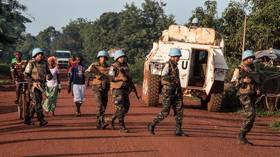Guardian cries ‘Russians are coming’ amid new scramble for Africa

As Western powers that once colonized Africa find themselves drawn back to the continent over its vast mineral riches, what can they do to divert attention? Why, blame Russia, of course!
Enter the Guardian, flogging – but not actually showing – alleged documents purporting to show the Kremlin plotting and scheming in Africa, involving none other than “Putin’s chef” and alleged mastermind of “internet trolls” accused of meddling in US politics, Evgeny Prigozhin.
The supposedly nefarious scheme consists of “building relations with existing rulers, striking military deals, and grooming a new generation of leaders” in at least 13 out of 54 African countries in an effort to exert influence, according to the Guardian’s Jason Burke and Luke Harding.
"Effort to exert influence" would have made a great euphemism for the old days of colonialism.
— Kit Newton 🇵🇸 (@kitnewtonium) June 11, 2019
In their telling, Russia’s peacekeeping presence in the Central African Republic (CAR) is supposed to help Moscow to expand “across the continent.” In actuality, the UN peacekeeping mission (MINUSCA) lists just over 11,000 troops, and Russia is not mentioned among the top 10 contributors. President Vladimir Putin’s announcement of a peacekeeping contingent in April referred to “up to thirty” personnel.
Likewise, Moscow’s military cooperation deals with “about 20 African states” are meant to sound sinister, though they basically involve maintenance of legacy weapons systems and purchase of new ones.
Poor quality article by Luke "russians-under-my-bed" Harding. There are 54 African nations & he only mentions a few. In those few African nations mentioned, Russian activities don't seem to be anything out of the ordinary & is minuscule compared to activities of Western nations
— JethroBoateng (@JethroBoateng) June 11, 2019
None of this is any different than what the US or the UK have been doing, and on a much greater scale, former British diplomat Craig Murray commented.
As former deputy head of the Foreign and Commonwealth Office Africa Department(E), I state with certainty this "scoop" by Russophobe MI6 sockpuppet Luke Harding contains no activity in Africa which the UK and USA do not also do.On a much greater scale. https://t.co/ccxln3X0e6
— Craig Murray (@CraigMurrayOrg) June 11, 2019
Burke is a Guardian correspondent based in Johannesburg, South Africa while Harding was based in Moscow, and is known as a purveyor of many a tall tale about Russia.
Harding wrote an entire book on ‘Russian collusion’ with US President Donald Trump – a conspiracy theory that was conclusively debunked by special counsel Robert Mueller’s investigation – and also authored the infamous story accusing former Trump campaign manager Paul Manafort of secretly meeting with WikiLeaks editor Julian Assange inside the Ecuadorian embassy in London, three times no less, without presenting a shred of evidence beyond assertions from anonymous sources.
Also on rt.com Guardian challenged over ‘fake’ Assange & Manafort story, as Luke Harding goes AWOLThe documents Burke and Harding based their article on were provided by the Dossier Center, a London-based outfit funded by the ex-convict and exiled Russian oligarch Mikhail Khodorkovsky. They were not made available to the public.
Wait they allowed fraudster @lukeharding1968 to publish again without retracting his bogus Manafort Assange story that was totally debunked yet The Guardian never retracted or apologized for? That's incredible they would ever allow him to write for them again.
— Currie Dobson (@Ventuckyspaz) June 11, 2019
While Russia has exactly zero military bases in Africa, the US has at least 25 declared ones across the continent, along with an entire combatant command, AFRICOM. Much of the US activity in Africa was virtually unknown until 2017, when a Navy SEAL died under dubious circumstances in Mali and several special operators and civilians were killed in a fatal ambush by Islamic State (IS, also known as ISIS) militants in Niger.
Like this story? Share it with a friend!














